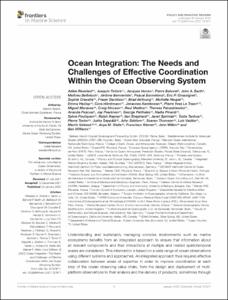| dc.contributor.author | Révelard, A. | |
| dc.contributor.author | Tintoré, J. | |
| dc.contributor.author | Verron, J. | |
| dc.contributor.author | Bahurel, P. | |
| dc.contributor.author | Barth, J.A. | |
| dc.contributor.author | Belbéoch, M. | |
| dc.contributor.author | Benveniste, J. | |
| dc.contributor.author | Bonnefond, P. | |
| dc.contributor.author | Chassignet, E.P. | |
| dc.contributor.author | Cravatte, S. | |
| dc.contributor.author | Davidson, F. | |
| dc.contributor.author | deYoung, B. | |
| dc.contributor.author | Heupel, M. | |
| dc.contributor.author | Heslop, E. | |
| dc.contributor.author | Hörstmann, C. | |
| dc.contributor.author | Karstensen, J. | |
| dc.contributor.author | Le Traon, P.Y. | |
| dc.contributor.author | Marques, M. | |
| dc.contributor.author | McLean, C. | |
| dc.contributor.author | Medina, R. | |
| dc.contributor.author | Paluszkiewicz, T. | |
| dc.contributor.author | Pascual, A. | |
| dc.contributor.author | Pearlman, J. | |
| dc.contributor.author | Petihakis, G. | |
| dc.contributor.author | Pinardi, N. | |
| dc.contributor.author | Pouliquen, S. | |
| dc.contributor.author | Rayner, R. | |
| dc.contributor.author | Shepherd, I. | |
| dc.contributor.author | Sprintall, J. | |
| dc.contributor.author | Tanhua, T. | |
| dc.contributor.author | Testor, P. | |
| dc.contributor.author | Seppälä, J. | |
| dc.contributor.author | Siddorn, J. | |
| dc.contributor.author | Thomsen, S. | |
| dc.contributor.author | Valdés, L. | |
| dc.contributor.author | Visbeck, M. | |
| dc.contributor.author | Waite, A.M. | |
| dc.contributor.author | Werner, F. | |
| dc.contributor.author | Wilkin, J. | |
| dc.contributor.author | Williams, B. | |
| dc.date.accessioned | 2022-02-01T23:24:50Z | |
| dc.date.available | 2022-02-01T23:24:50Z | |
| dc.date.issued | 2022 | |
| dc.identifier.citation | Révelard, A., Tintoré, J., Verron, J., Bahurel, P., Barth, J.A., et al
(2022) Ocean Integration: The Needs
and Challenges of Effective
Coordination Within the Ocean
Observing System. Frontiers i Marine Science, 8:737671, 15pp,
DOI: 10.3389/fmars.2021.737671 | en_US |
| dc.identifier.uri | https://repository.oceanbestpractices.org/handle/11329/1860 | |
| dc.description.abstract | Understanding and sustainably managing complex environments such as marine
ecosystems benefits from an integrated approach to ensure that information about
all relevant components and their interactions at multiple and nested spatiotemporal
scales are considered. This information is based on a wide range of ocean observations
using different systems and approaches. An integrated approach thus requires effective
collaboration between areas of expertise in order to improve coordination at each
step of the ocean observing value chain, from the design and deployment of multiplatform
observations to their analysis and the delivery of products, sometimes through data assimilation in numerical models. Despite significant advances over the last two
decades in more cooperation across the ocean observing activities, this integrated
approach has not yet been fully realized. The ocean observing system still suffers from
organizational silos due to independent and often disconnected initiatives, the strong
and sometimes destructive competition across disciplines and among scientists, and
the absence of a well-established overall governance framework. Here, we address the
need for enhanced organizational integration among all the actors of ocean observing,
focusing on the occidental systems. We advocate for a major evolution in the way we
collaborate, calling for transformative scientific, cultural, behavioral, and management
changes. This is timely because we now have the scientific and technical capabilities
as well as urgent societal and political drivers. The ambition of the United Nations
Decade of Ocean Science for Sustainable Development (2021–2030) and the various
efforts to grow a sustainable ocean economy and effective ocean protection efforts all
require a more integrated approach to ocean observing. After analyzing the barriers
that currently prevent this full integration within the occidental systems, we suggest
nine approaches for breaking down the silos and promoting better coordination and
sharing. These recommendations are related to the organizational framework, the ocean
science culture, the system of recognition and rewards, the data management system,
the ocean governance structure, and the ocean observing drivers and funding. These
reflections are intended to provide food for thought for further dialogue between all
parties involved and trigger concrete actions to foster a real transformational change in
ocean observing. | en_US |
| dc.description.sponsorship | EuroSea | |
| dc.description.sponsorship | European Union | |
| dc.language.iso | en | en_US |
| dc.rights | Attribution 4.0 International | * |
| dc.rights.uri | http://creativecommons.org/licenses/by/4.0/ | * |
| dc.subject.other | Integration | en_US |
| dc.subject.other | Organizational silos | en_US |
| dc.subject.other | Ocean governance and management | en_US |
| dc.subject.other | Coordination | en_US |
| dc.title | Ocean Integration: The Needs and Challenges of Effective Coordination Within the Ocean Observing System. | en_US |
| dc.type | Journal Contribution | en_US |
| dc.description.refereed | Refereed | en_US |
| dc.format.pagerange | 15pp. | en_US |
| dc.identifier.doi | 10.3389/fmars.2021.737671 | |
| dc.subject.parameterDiscipline | Cross-discipline | en_US |
| dc.bibliographicCitation.title | Frontiers in Marine Science | en_US |
| dc.bibliographicCitation.volume | 8 | en_US |
| dc.bibliographicCitation.issue | Article 737671 | en_US |
| dc.description.sdg | 14.a | en_US |
| dc.description.eov | N/A | en_US |
| obps.contact.contactname | Adèle Révelard | |
| obps.contact.contactemail | arevelard@socib.es | |
| obps.resourceurl.publisher | https://www.frontiersin.org/articles/10.3389/fmars.2021.737671 | |
 Repository of community practices in Ocean Research, Applications and Data/Information Management
Repository of community practices in Ocean Research, Applications and Data/Information Management

